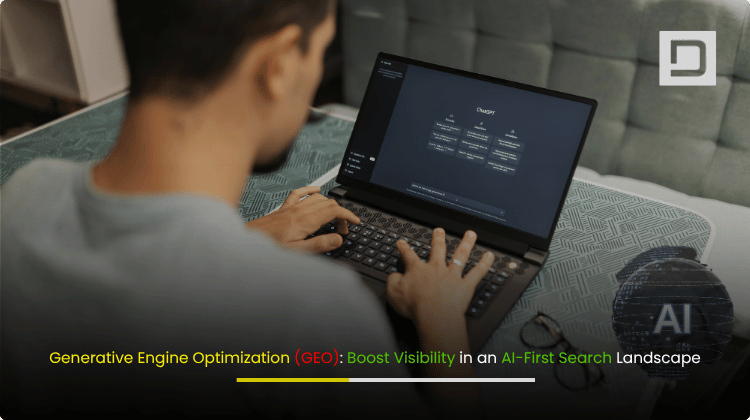Generative Engine Optimization (GEO): Boost Visibility in an AI-First Search Landscape
The digital world is experiencing a dramatic shift. Traditional search engines like Google and Bing, once focused on crawling and indexing static web pages, are now evolving into AI-first engines. ChatGPT, Gemini, Bing Copilot, Perplexity, and other large language model (LLM)-powered search platforms no longer serve only hyperlinks; they generate contextual, conversational answers.
In this AI-first search landscape, the very fabric of discoverability and brand authority is changing. Instead of ranking for blue links, businesses now compete to be included in AI-generated responses, summaries, and recommendations.
This revolution demands a new optimization mindset—Generative Engine Optimization (GEO).
What is Generative Engine Optimization (GEO)?
Generative Engine Optimization (GEO) refers to the set of strategies, practices, and technologies designed to ensure that your digital content, data, and brand presence are easily understood, indexed, and surfaced by generative AI search engines.
Unlike traditional SEO—which focuses on keyword rankings and backlink building for static search results—GEO targets the algorithms and large language models that power AI-generated responses.
In essence, GEO is about making your business, expertise, and assets easily retrievable, understandable, and trustworthy for AI engines—so when someone asks ChatGPT, Gemini, or Bing Copilot for recommendations, your brand stands out and gets featured in the generated answers.
GEO blends elements of technical SEO, content engineering, data structuring, brand reputation management, and AI-driven feedback loops to optimize not just for search bots, but for conversational, multimodal, and context-aware AI engines.
How AI-First Search Engines Work
To fully appreciate the importance of GEO, it’s crucial to understand how today’s AI-first search engines operate.
The Anatomy of AI-Driven Search
- Query Understanding: AI search platforms interpret not just keywords, but the context, intent, and entities within a query.
- Retrieval and Ranking: Instead of fetching a list of web links, the engine draws on multiple data sources—including structured databases, knowledge graphs, web content, and proprietary LLM training datasets.
- Generative Synthesis: The AI then generates a synthesized response—a summary, an answer, a comparison, or a recommendation—by reasoning over all the retrieved data.
- Attribution and Citations: Top AI-first engines increasingly reference original sources or cite trustworthy brands, reinforcing the need for recognized, authoritative, and well-structured content.
What does this mean for businesses?
Optimizing for AI search engines is not about ranking #1 for a keyword, but about being included, quoted, or cited in AI-generated answers.
Why GEO Matters: The New Rules of Online Visibility
In 2025, online visibility is increasingly determined by AI models, not just algorithms. Consider these new rules:
- Content must be AI-understandable: If your information isn’t structured for LLMs, it will be missed or misrepresented.
- Authority and trust matter more than ever: AI models favor reputable, expert, and transparent sources.
- Multimodal signals influence selection: Text, images, structured data, video, and even APIs are factored into AI search results.
- Conversational readiness is a must: If your brand’s narrative and data aren’t easily answerable or quotable, you won’t appear in voice or chat results.
With GEO, you align your content and digital assets for these new selection criteria—ensuring your business becomes a featured answer, not a footnote.
The Pillars of Generative Engine Optimization
1. Content Engineering for AI
Modern generative engines digest, parse, and synthesize enormous volumes of data. Content must be machine-readable, semantically rich, and factually reliable.
- Break down complex topics into clear, contextual narratives.
- Use language that mimics how people ask questions, not just how bots crawl web pages.
- Craft content for multiple user intents—informational, transactional, comparative, etc.
2. Structured Data and Semantic Markup
Structured data (schema.org, JSON-LD, microdata) helps AI engines recognize entities, relationships, and facts about your business.
- Mark up business details, FAQs, product attributes, and reviews.
- Link to relevant datasets, authority profiles, and knowledge graph nodes.
- Maintain up-to-date sitemaps and entity references.
3. E-E-A-T and Brand Authority
Experience, Expertise, Authoritativeness, and Trustworthiness (E-E-A-T) are not just for Google—they’re essential for generative AI, too.
- Publish in-depth, well-researched, and fact-checked content.
- Build author profiles, transparent sourcing, and real testimonials.
- Foster citations, mentions, and signals of authority across the web.
4. Technical SEO Meets AI Optimization
Technical SEO remains foundational—but now, it must extend to AI-first scenarios.
- Ensure fast, mobile-first, and accessible web design.
- Optimize crawlability for both search bots and LLM crawlers.
- Keep code and APIs clean, documented, and up-to-date for integration by third-party AI agents.
5. Continuous Feedback and Iteration
GEO is never “set and forget.”
- Monitor AI-generated answers for brand mentions and accuracy.
- Use analytics and user feedback to spot content gaps and misinformation.
- Iteratively refine content and structure based on observed AI behaviors and search trends.
GEO vs. Traditional SEO: Understanding the Differences
| Aspect | Traditional SEO | Generative Engine Optimization (GEO) |
|---|---|---|
| Focus | Ranking web pages for keywords | Being included in AI-generated answers |
| Target | Search engine algorithms (Google, Bing) | LLMs, knowledge graphs, conversational AI |
| Content | Keyword-rich articles, backlinks | Contextual, structured, entity-based content |
| Signals | Backlinks, meta tags, site speed | E-E-A-T, semantic markup, brand authority |
| User Experience | Web click-through | Conversational answers, voice, multimodal |
| Measurement | SERP position, traffic volume | AI citations, summary inclusion, entity mentions |
In short, GEO adapts your optimization strategy for the era of AI-first search, where conversation, understanding, and trust take center stage.
Practical GEO Strategies for 2025 and Beyond
Creating AI-Ready Content
1. Write for Human + AI Readability:
Use clear, concise language. Anticipate user questions and intents. Structure long-form content with headings, summaries, FAQs, and explicit answers.
2. Focus on Entities and Context:
Identify and highlight key entities (people, places, products, technologies) relevant to your industry. Link out to reputable sources and knowledge bases to establish authority and trust.
3. Leverage Structured Data Markup:
Implement schema.org types relevant to your business—Organization, Product, FAQ, HowTo, Review, Author, etc. Use JSON-LD to embed machine-readable facts.
Optimizing for Multimodal and Conversational AI
1. Embrace Multimodal Content:
Generative engines synthesize from images, video, audio, and text. Provide high-quality visuals, descriptive alt text, transcripts, and data files wherever possible.
2. Prepare for Voice and Chat:
Rewrite key information in conversational Q&A formats. Address “who, what, where, when, why, and how” questions directly within your content.
Schema, Entities, and Knowledge Graphs
1. Build Your Entity Graph:
Ensure your business, products, and team are referenced consistently across your site and third-party sources. Claim and enhance your entries on Wikipedia, Wikidata, Crunchbase, LinkedIn, and industry databases.
2. Connect the Dots:
Link related pages and entities within your content. Use contextual anchor text. Reference industry standards and recognized authorities.
3. Maintain a Clean Data Footprint:
Minimize duplication, outdated information, and conflicting facts. Synchronize business details across all digital assets.
Real-World GEO Success Stories
Let’s look at how leading brands are embracing GEO:
- SaaS Companies: Embedding detailed API documentation, use-case content, and code snippets, resulting in their products being cited as solutions by ChatGPT and other LLMs.
- eCommerce Leaders: Structuring rich product data, FAQs, and reviews, so that AI engines confidently recommend their products in summary answers.
- Professional Services Firms: Publishing in-depth expert commentary and marking up bios, boosting the likelihood of being quoted in AI-generated industry roundups.
By following these steps, you dramatically increase your brand’s discoverability in the new AI-first paradigm.
How to Audit Your Current Content for GEO Readiness
A GEO audit is an essential first step in the optimization journey. Here’s a framework for assessing your current assets:
1. Content Inventory:
Catalog all major web pages, blogs, product descriptions, and documentation. Assess for clarity, structure, and completeness.
2. Structured Data Check:
Use tools like Google’s Rich Results Test, Schema.org Validator, and Bing Markup Validator to ensure proper schema implementation.
3. E-E-A-T Assessment:
Review content for signals of expertise, transparency, and trust. Are authors credited? Are sources cited? Are reviews and testimonials verifiable?
4. Entity Consistency:
Check that your business, products, and team names are referenced consistently across your website and the wider web.
5. Multimodal Readiness:
Ensure images, videos, and PDFs include descriptive text, metadata, and proper attributions.
6. AI Query Simulation:
Ask ChatGPT, Gemini, or Perplexity questions related to your niche. See which brands and content get cited. Analyze gaps where your business is missing.
With this audit, you’ll uncover both opportunities and blind spots in your AI optimization strategy.
The Role of Generative AI in Shaping Search Results
AI-first search is fundamentally different because it generates answers, not just ranks pages.
How AI Models “Choose” What to Feature
- Training Data: LLMs are trained on massive, diverse datasets—including web pages, books, code repositories, and databases.
- Citations and Authority: When generating an answer, models weigh the reliability, structure, and authority of the underlying sources.
- Contextual Matching: AI understands queries in context, matching them to relevant entities and facts across its knowledge graph.
- Summarization and Synthesis: AI compresses vast information into concise answers, favoring clear, unambiguous, and well-structured content.
For your brand, this means every digital asset you produce must be both human- and machine-understandable, trusted, and contextually rich.
The Future of GEO: Trends and Predictions
Generative Engine Optimization is a fast-evolving field. Here’s what’s next:
1. Proactive Entity Management
Brands will proactively manage their digital “entity graph” across websites, social media, industry databases, and open data sources to ensure consistent AI understanding.
2. Conversational API and Voice Optimization
As voice search and conversational AI become dominant, optimizing for question-answer patterns, dialogue, and hands-free interaction will be essential.
3. Real-Time Feedback Loops
Automated tools will scan AI-generated answers for mentions, sentiment, and accuracy—prompting instant updates to source content.
4. Multimodal Asset Integration
Images, audio, and video will be structured and marked up for generative engines, enabling richer and more diverse answer formats.
5. Hyper-Personalization
AI search engines will tailor results to individual user preferences and contexts. GEO will need to address multiple personas, intents, and scenarios within each piece of content.
6. Greater Role of Open Data and APIs
Connecting your data to open standards and APIs will increase the chances of your information being included in AI-generated knowledge graphs.
Choosing a GEO Agency: Why Depex Technologies Leads the Way
Optimizing for generative AI search is not a one-time project—it’s a strategic, ongoing partnership. Here’s why Depex Technologies is your ideal partner for GEO success:
1. Proven AI-First SEO Expertise
Depex Technologies pioneers the integration of traditional SEO, advanced content engineering, and the latest AI-readiness frameworks. In addition, our team is skilled in both the technical and creative aspects of GEO.
2. Full-Spectrum GEO Services
We offer comprehensive GEO audits, content engineering, structured data implementation, E-E-A-T reinforcement, multimodal optimization, and ongoing AI search monitoring.
3. Custom Solutions for Every Industry
Whether you’re in SaaS, eCommerce, healthcare, finance, or any other field, we tailor GEO strategies that address your unique business goals and target audience.
4. Transparent Reporting and Collaboration
With Depex Technologies, you get clear, actionable reports on your AI-first search performance—along with collaborative workshops and training for your in-house teams.
5. Future-Proof Your Brand
Our solutions are designed for adaptability, so your brand remains visible, authoritative, and trusted as AI search engines continue to evolve.
Conclusion: Take the Lead with Depex Technologies
The digital landscape is changing fast, and the winners will be those who adapt early and strategically. Generative Engine Optimization (GEO) is no longer optional; it’s essential for any business looking to thrive in an AI-first search ecosystem.

Are you ready to boost your visibility, credibility, and customer engagement in a world where AI drives search?
Let Depex Technologies be your trusted partner.
We bring deep expertise in GEO, technical SEO, and AI-first content engineering. From detailed audits and structured data to conversational content and continuous monitoring, we ensure your business is always discoverable, referenced, and featured in AI-generated answers—no matter how the search landscape evolves.
Partner with Depex Technologies to unlock your brand’s full potential in the AI-first search era.
Contact us today to begin your GEO journey—and leave your competition behind.






